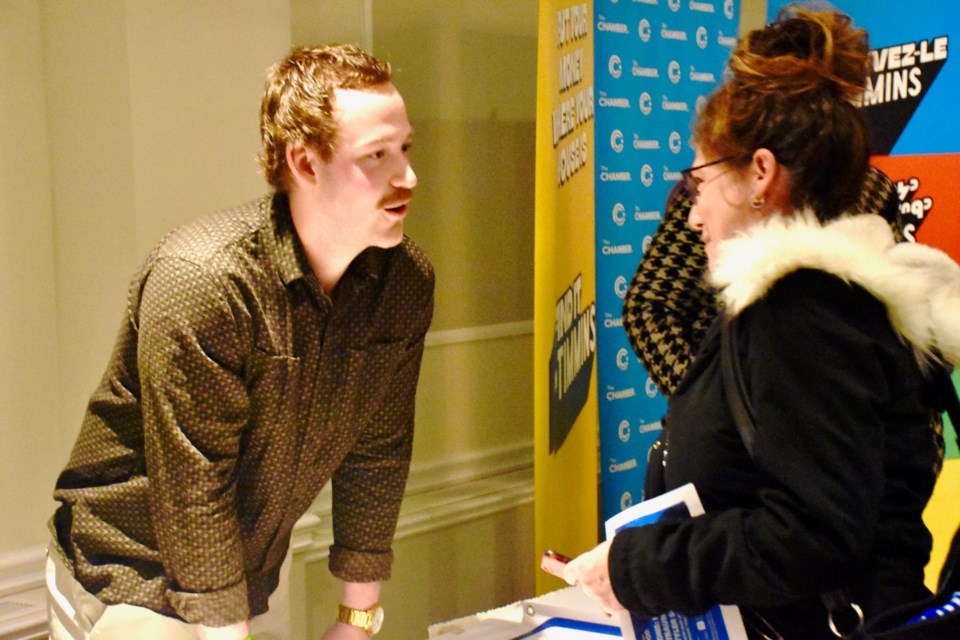'I need help' are some of the hardest words to acknowledge, says Tyler Smith.
While the Humboldt Broncos bus crash survivor suffered in silence following the 2018 crash, today he's sharing his journey of dealing with trauma and grief to help others.
For nearly an hour this afternoon, the former junior hockey player shared his story with a packed room at the Porcupine Dante Club.
Tonight, he'll be talking at Timmins High and Vocational School. The doors open at 6:30 p.m. and it's open to the public. Admission is a donation to the Chamber for Good to benefit Sports for Kids Timmins. You can also watch it live on YouTube.
“This is something I never really anticipated doing and this is something I never actually thought I would travel to Northern Ontario for,” he said.
Over the past five years, Smith has gained a new perspective on life, relationships, conversations, mental health, trauma and grief.
April 6, 2018, was a regular day, he shared.
The Humboldt Broncos were in a playoff series with a rival team. The team had a morning practice and ate breakfast at a favourite local spot before boarding the bus.
In a tragic crash, 16 people — 10 players, two coaches, an athletic therapist, a statistician, a radio announcer and the team's bus driver — were killed. There were 13 survivors.
“For me, I don’t have any recollection of that day, which is … I thought about this a lot and I almost think it is a blessing in disguise. The emotional and mental injuries that I can’t even fathom that individuals went through from that day, it just … it blows my mind,” Smith told the local audience.
Along with suffering a stroke that day, Smith had a broken collar bone, punctured lung, two broken ribs, a broken shoulder blade and had part of his small intestine removed. He was in the hospital for 13 days.
After the crash, Smith focused on recovering physically.
“I was a firm believer that the mental and emotional (health) would just follow. It doesn’t happen like that,” he said.
At the time, he thought if he put his nose down and put his work boots on every day, people wouldn't notice that he was struggling.
He even played hockey for the Humboldt Broncos again.
“But at this time, it was about everybody else,” he said.
After 10 games, he texted his parents to say he wasn't having fun anymore.
“That was the moment I knew my decision. I knew exactly what I needed to do, but I was not ready to come to terms with it because I’m thinking to myself, ‘I’m going to let everybody down.’ Everybody that’s supported us across Canada, everybody that was involved in the crash that day, every family that was involved that lost somebody — I’m going to let them down,” he said.
When he opened up to his billet parents, his second mom gave him a humongous hug and made him promise that he'll get help. That's when Smith realized the mask he was putting on every day was deeply affecting his relationships with his people.
Smith started going to therapy and the first time he shared his story publicly, he received a standing ovation. Afterwards, people of all ages waited to talk to him.
People sharing their connection and their stories with Smith are affirmations that people need community.
"Especially in an uncomfortable space, especially in a difficult space like mental health. People just want to relate and people just want authenticity. Authenticity is that baby practice of letting go of who we think we are and embracing who we truly are. And having that authenticity is a monumental thing,” he said.
It's not about comparing stories, Smith said, or diminishing your story because another person has it better or worse.
"And you’re right, but your story matters as well so focus on that. Focus on the fact that you can be selfish sometimes and you can remember that you’re not alone,” he said.
'I can't thank you enough'
In the wake of the bus crash, the country united in support of Humboldt.
“I think I want to emphasize that the love and support we received is something that I will never be able to thank everybody for,” he said.
People left hockey sticks on porches and wore hockey jerseys to honour the players.
Those efforts didn't go unnoticed and helped the survivors through a lot of hard days.
“I can’t thank you enough. I used to drive with my mom to my physio appointments and we would see a hockey stick or sticker up and she would almost come to tears every time. It’s just amazing what the hockey community is all about and we felt that,” he said.
Opening up takes strength
Along with taking public speaking gigs, Smith is working in other ways to start and continue conversations about mental health.
Not Alone Co., a clothing company he founded, is focused on mental health. The clothing and hats share direct messages such as Not Alone It's Okay to Not be Okay.
Having the messages in bright colours and large font is intentional.
“Because I want people to wear their vulnerability proudly. I want you to be proud of the fact that being vulnerable and opening up requires a ton of strength, requires a ton of courage and a ton of bravery,” he said.
To normalize mental health in sports, he also hosts a podcast Speak Your Mind with former NHLer Riley Shehan.
